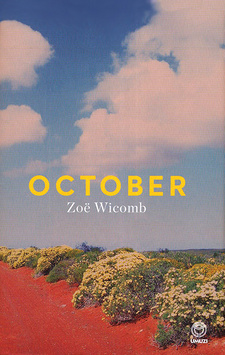October, by Zoe Wicomb

October, by Zoe Wicomb. Random House Struik Umuzi. Cape Town, South Africa 2014. ISBN 9781415207062 / ISBN 978-1-4152-0706-2
Zoë Wicombs October is a moving family history and an incisive commentary on what it means to belong.
Mercia Murray is a woman of fifty-two years who has been left. There is the ready-made condition of having been left and that, as we know, as she knows, involves a death of sorts. But that is a less-than-helpful metaphor. For all the emptiness, there is her broken heart and an unthinkable amount of tears. As a thinking woman, Mercia goes over every gesture, every word that was uttered at the time, in search perhaps of ambiguity, but reflection reveals no hidden meanings. She has been left, and that is the banal truth. Thus, moving from the passive voice, from the self as subject, her thoughts stumble over the question: whom has she been left by? Well, she can hardly say that Craig has left her, since the man who spoke and acted was not the Craig she knew. Thus another ready-made: Mercia has been left by a stranger. Which should mean that there is something unreal about her grief, but that does not stop the tears from flowing, the heart from bursting. Mercia has a best friend, her younger colleague Smithy, who says that time will bring an end to the suffering. When Mercia, slumped on the sofa, stops crying for a second to send a scornful look, Smithy warns that ready-mades cannot be sniffed at, and that there is the danger of becoming addicted to grief. Many a left one will not let go of the condition, will cosset a heart that lurches about to the broken rhythms of sobbing. Smithy claps her hands and says, Let's get organised. What do you have to do this week? Let's clear lectures and supervisions for the next three days so you can get some healing sleep. Which makes Mercia sit up. Good old considerate Craig, she says wryly, not a stranger after all. See how he chose a Friday afternoon to tell me. All packed up and gone within a day, leaving me with a long weekend for grieving. By tomorrow I will have cried my heart out, so no need to miss a single class, she sobs. There's my girl, Smithy says, and pulls out of her bag the peaty, medicinal Bruichladdich that they discovered on a trip to Islay. This will put hair on your chest. Jacques Theophilus Murray is a bad egg. Unlike an egg his badness is not contained, concealed within a sound, flawless shell. He is a drunk, and wears his drunkenness on his sleeve, which is to say that there are bags under his eyes, that his face is a flushed mass of veins barely concealed by his dark brown colouring, and that Meester, a pillar of respectability in the village of Kliprand, has suffered the humiliation of his son spending his days in the new, unfortunately named Aspoester bar that has opened in the village. Jake wears his trousers low down on his hips, showing the crack of his buttocks. Which may be the fashion nowadays amongst well-to-do young men, but he is neither young nor well-to-do; there may well be a whiff of urine; and, in fact, the trousers reference the skollie gear of his youth. When Jake wakes on the morning of the first of September with an evil taste in his mouth, his first thought is of oblivion. [...]
This is an excerpt from the novel October, by Zoe Wicomb.
Title: October
Author: Zoe Wicomb
Genre: Novel
Publisher: Random House Struik
Imprint: Umuzi
Cape Town, South Africa 2014
ISBN 9781415207062 / ISBN 978-1-4152-0706-2
Hardcover, dustjacket, 15 x 22 cm, 272 pages

